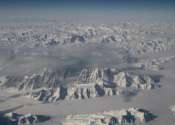Paleoceanography is a peer-reviewed scientific journal published by the American Geophysical Union. It covers the history of the ocean and its plant and animal life.
Paleoceanography accepts articles that reconstruct past conditions and processes recorded in sediments deposited in water. The main focus is on marine sediments, but also extends to sediments from freshwater environments. The past is reconstructed using sedimentology, geochemistry, paleontology, oceanography, geophysics, and modeling. Contributions are global and regional in scope and cover all ages, Precambrian to Quaternary, including modern analogs.
Paleoceanography is abstracted and indexed by GEOBASE, GeoRef, Scopus, PubMed, Web of Science, and several CSA indexes. According to the Journal Citation Reports, the journal has a 2010 impact factor of 4.030, ranking it first out of 48 journals in the category "Paleontology", 8th among 165 journals in the category "Geosciences, Multidisciplinary", and 3rd out of 59 journals in the category "Oceanography".
- Publisher
- American Geophysical Union
- Country
- United States
- History
- 1986-present
- Website
- http://www.agu.org/journals/pa/
- Impact factor
-
4.030
()
Some content from Wikipedia,
licensed under CC BY-SA








